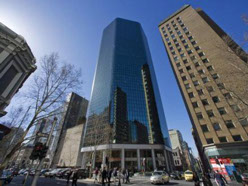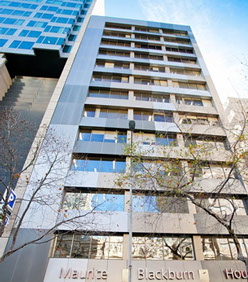
:: Investment Sourcing/Transaction Execution

In mid-2006, 200 Queen Street was owned by a stand-alone property fund managed by the now-defunct MFS Group. Due to a succession of tenants vacating the building, the manager was unable to meet forecast distributions to investors from income and was topping up distributions out of debt funding – a situation that quickly became unsustainable and necessitated MFS finding a means to exit the investment.
Recognising the opportunity this presented to one of the Macquarie investment funds which was then searching for investment properties, we were able to work with MFS on an innovative “stapling” structure whereby the investors in MFS became investors in Macquarie Direct Property Fund and at the same time allowing the Macquarie fund to take over the existing Suncorp loan on the property which had been agreed on terms which were exceptionally favourable to MFS.
Utilising this structure, the property was effectively absorbed into the Macquarie fund at a price of $90 million in a manner which avoided payment of stamp duty and without the need for equity contributions from investors in the Macquarie fund.
Importantly too despite the anchor tenant electing to vacate approximately 30% of the property prior to completion of the transaction, we were able to replace them within 2 months with another tenant on more favourable terms, therefore adding immediate value to investors.
Finally, despite being acquired at a time that proved to be near the peak of the property cycle, due primarily to astute leasing asset management immediately following the acquisition, the property is currently valued at a level 6% in excess of its purchase price.
: : EXAMPLE 1
200 Queen Street, Melbourne


In mid 2009, Australian interest rates hit long-term lows and the Australian dollar had retreated against major currencies such as the Euro. At the same time, however, property prices had decreased significantly from late 2007 levels due to a seizing up of funding caused by the Global Financial Crisis.
This set of circumstances had led to increasing investor interest from German-based investors looking to acquire good quality assets in Australia.
Working in tandem with Macquarie’s Munich office, we identified and secured an option over a building in the Adelaide CBD which was securely leased to the South Australian government for 12 years, with a view to capitalizing on the investor appetite in Germany and establishing a retail investment fund for the building.
The transaction proved to be exceptionally complex due to both the unique nature of the building, which had a lot of complicated title issues that needed to be first understood by the local team and by a range of external extenuating circumstances, the most significant of which was the sale of the Macquarie Property Funds platform in the middle of the transaction, which meant that Macquarie was no longer in a position to complete the transaction.
However, through our excellent working relationship with the vendor, we were able to overcome these difficulties and eventually complete the purchase on behalf of the Atlantic Group, a Hamburg-based asset origination company, who have subsequently sold down the equity to German retail investors as originally envisaged.
By taking advantage of favourable buyer conditions in purchasing the property and renewing a number of smaller tenancies in the property at higher than forecast rents, we were able to raise the value of the property by 15% within one year, delivering our German clients an exceptional outcome on their investment.
: : EXAMPLE 2
Riverside Centre, North Terrace, Adelaide


In late 2008 following the collapse of Lehman Brothers, there was a global shortage of liquidity and many property funds found themselves unable to either re-finance their bank loans at all or at least to a level of gearing previously available prior to the Global Financial Crisis.
Accordingly almost all Australian listed and unlisted property funds were put in a position where they had to de-leverage their portfolios through asset sales, in spite of the fact that 2008-2009 would prove an exceptionally difficult time to do so, given that buyers faced the same problems securing finance that existing owners had.
In spite of the difficulties of selling properties under those conditions, we were able to raise over $110 million for the fund via the sale of 3 Melbourne CBD buildings during the 2008-9 financial year, relieving significant lender pressure on the fund and enabling it to successfully renegotiate loan arrangements on its remaining portfolio.
Significantly, all 3 of the properties sold (303 Collins Street, 461 Bourke Street and 456 Lonsdale Street) were of lower quality than most other assets in the fund, enabling the fund to retain its higher quality and better returning properties for the benefit of unitholders. Further, because all 3 buildings were purchased at a low point in the cycle and remained well leased during the period of ownership, despite having to be sold at the bottom of the market, all nonetheless provided a positive return for the fund.
To find out more about how Killila Property Group can assist, contact us on 0414 474 756.
: : EXAMPLE 3
Sell down of assets in Macquarie Direct Property Fund

